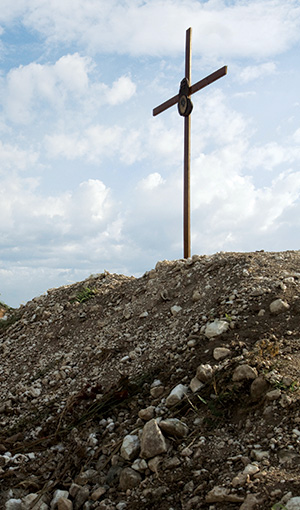Advocating for the Weak
Printer Friendly Version After a report by a U.N.-appointed panel concluded that a group of U.N. peacekeepers brought cholera to Haiti and transmitted it through a leaky camp latrine, Bea Lindstrom ’10, Ellie Happel ’11, and Greger Calhan ’12 worked with the Boston-based Institute for Justice and Democracy in Haiti last November to file a petition seeking compensation on behalf of the nearly 7,000 who have died from the disease and half a million others who have been sickened. “The cholera outbreak is directly attributable to the negligence, gross negligence, recklessness, and deliberate indifference for the health and lives of Haiti’s citizens by the United Nations,” the petition says. The filing has drawn substantial media attention. “We are advocating for justice for Haiti’s cholera victims, but we are also pushing a larger question of accountability, which is such a central principle of human rights law,” says Lindstrom.
After a report by a U.N.-appointed panel concluded that a group of U.N. peacekeepers brought cholera to Haiti and transmitted it through a leaky camp latrine, Bea Lindstrom ’10, Ellie Happel ’11, and Greger Calhan ’12 worked with the Boston-based Institute for Justice and Democracy in Haiti last November to file a petition seeking compensation on behalf of the nearly 7,000 who have died from the disease and half a million others who have been sickened. “The cholera outbreak is directly attributable to the negligence, gross negligence, recklessness, and deliberate indifference for the health and lives of Haiti’s citizens by the United Nations,” the petition says. The filing has drawn substantial media attention. “We are advocating for justice for Haiti’s cholera victims, but we are also pushing a larger question of accountability, which is such a central principle of human rights law,” says Lindstrom.
Also concerning Haiti, the Center for Human Rights and Global Justice released a report in January confirming what women’s groups have found on the ground: in an alarming 14 percent of households in tent camps set up for those still displaced by the 2010 earthquake, at least one person had been a victim of rape or sexual assault. “Humanitarian best practices for preventing and responding to sexual violence need to be implemented immediately” in Haiti’s tent camps, said Professor Margaret Satterthwaite ’99, a faculty director at CHRGJ and the principal investigator for the study. “Simple measures like installing lighting in camps and locks in latrines must be coupled with long-term strategies for women’s economic empowerment.”
—
